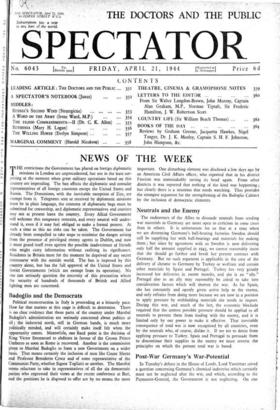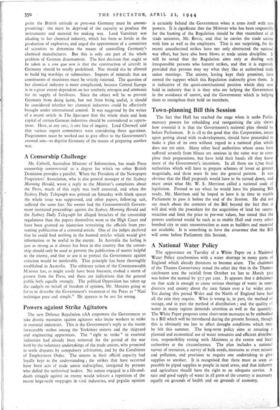Post-War Germany's War-Potential
In Tuesday's debate in the House of Lords, Lord Vansittart raised a question concerning Germany's chemical industries which certainly must not be neglected after the war, and which, according to the Paymaster-General, the Government is not neglecting. On one
point the British attitude to post-war Germany must be uncom- promising: she must be deprived of the capacity to produce the instruments and material for making war. Lord Vansittart was alluding to her chemical industry, which has been so fertile in the production of explosives, and urged the appointment of a committee of scientists to determine the means of controlling Germany's chemical manufactures. But this is only one part of the whole problem of German disarmament. The first decision that ought to be taken as a sine qua non is that the construction of aircraft in Germany should be totally prohibited. Nor should she be allowed to build big warships or submarines. Imports of minerals that are constituents of munitions must be strictly rationed. The question of her chemical industry is more complicated, because Central Europe is to a great extent dependent on her synthetic nitrogen and ammonia for its supply of fertilisers. Since the object will be to prevent Germany from doing harm, but not from being useful, it should be considered whether her chemical industries could be effectively brought under international control. It was suggested by the writer of a recent article in The Spectator that the whole share and loan capital of certain German industries should be surrendered as repara- tions. Here, at any rat; is one line of inquiry. Lord Cherwell said that various expert committees were considering these questions. Programmes must be worked out to give effect to the Government's avowed aim—to deprive Germany of the means of preparing another war.



























